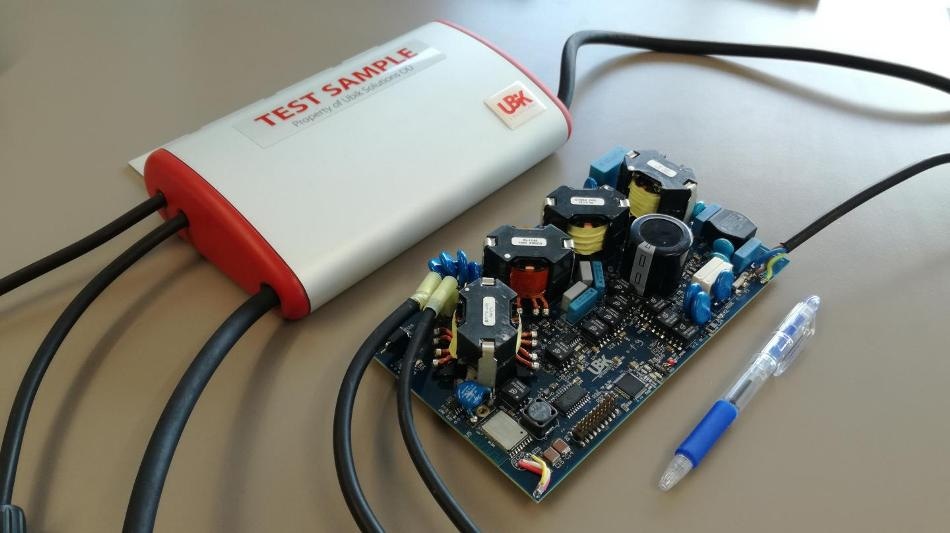Jun 12 2019
The entire world is eventually advancing toward a more sustainable lifestyle. Changes in the present lifestyle and introduction of new, more sustainable solutions in daily consumption are needed for the sustainability of the environment.
 Optiverter, photo by Dmitri Vinnikov. (Image credit: Dmitri Vinnikov)
Optiverter, photo by Dmitri Vinnikov. (Image credit: Dmitri Vinnikov)
For more than 10 years, the TalTech Power Electronics research team headed by researcher-professor Dmitri Vinnikov has been striving to enhance the efficiency of alternative energy generation units.
In the early years of the alternative energy deployment, it was outrageously expensive for an ordinary consumer, but the developments in recent years, the triumph of materials technology and the efforts of power electronics engineers have made the price much more affordable for the consumers.
Professor Dmitri Vinnikov, Researcher, TalTech Power Electronics
The team of scientists headed by Dmitri Vinnikov is concentrating on studying solar photovoltaic energy production. Under optimal conditions, any photovoltaic system (solar power plant) would provide consumers with electricity without any issues. Unfortunately, at the latitudes of Northern Europe, there are no optimal operating conditions for PV modules.
The environmental and natural factors that influence the performance of such systems are mostly (apart from Nordic sunlight) accumulation of dirt (snow, soil, leaves) on PV module surfaces and long shadows caused by lower sun angle effect.
“In order to convert energy, which comes from the renewable energy sources, into electricity for the consumers, a grid converter must be used, which transforms the output of the renewable energy source into a current suitable for home appliances. In addition to a converter, a special device called power optimizer must be used to maximize energy harvest so that it would not be influenced by weather and would provide maximum benefit for the consumer,” describes Dmitri Vinnikov.
The power electronics scientists of Tallinn University of Technology have moved closer to tackling this issue. They have created a hybrid technology Optiverter that integrates the important benefits of photovoltaic power optimizers and grid converters. It is an innovative power semiconductor converter technology used in the power systems of small and medium-sized PV installations, and probably for constructing integrated PV.
The first model of the Optiverter was developed back in 2016. After three years of inclusive R&D activities, the research team together with Estonian company Ubik Solutions OÜ is planning to begin mass production of Optiverters shortly, which are essential in residential solar PV systems.
“Thanks to the patented multimode control, the input voltage range is up to three times wider compared to commercial competitors. Like the power optimizers of PV modules, the Optiverter ensures maximum energy harvest even if a PV module is under the heavy or opaque shade, which usually blocks energy production with conventional PV microinverters. This is an advantage that distinguishes it from the current technology available on the market,” states Professor Vinnikov.
The researchers calculate the lifespan of the Optiverter to be around 25 years (the same as the lifespan of a top-grade solar panel). The Optiverter has very useful advantages when compared to the existing, fossil fuel-based energy production. In the longer run, the Optiverter technology is environmentally friendly as well as sustainable.
It is obvious that renewable energy, be it wind energy, biofuel, natural gas or solar energy, is the future. Even if there weren’t increasingly stringent EU requirements (applied to fuel prices of motor vehicles, but also for instance to construction work and energy production, etc.) to be complied with, life itself would force us to use more sustainable alternative technologies. All this makes the current, conventional energy production increasingly costly, while the PV systems are experiencing incredible cost reduction for the last five years.
Professor Dmitri Vinnikov, Researcher, TalTech Power Electronics
This research was supported by grants from Ubik Solutions OÜ, the Estonian Research Council (project PUT1443), and the Estonian Centre of Excellence in Zero Energy and Resource Efficient Smart Buildings and Districts (ZEBE).